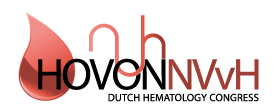Transfer of stem cell-derived NK cells in rel/ref AML patients: the phase 1 NK4AML study
Allogeneic natural killer (NK) cell-based immunotherapy is a promising, well-tolerated adjuvant therapeutic approach for AML. To improve NK cell adoptive immunotherapy in cancer patients, we developed a unique GMP-compliant culture system for the generation of large numbers of highly functional NK cells from umbilical cord blood (UCB)-derived CD34+ hematopoietic stem and progenitor cells (named RNK001). In a phase I study, we assessed the feasibility, safety, and toxicity of RNK001 NK cell adoptive immunotherapy with subcutaneous (SC) administration of IL-2 for relapsed/refractory AML disease.
Nine MDS-EB, MDS/AML, or AML patients with relapsed or refractory disease were treated with a single fixed dose of 1.0 – 3.0 x 109 allogeneic RNK001 NK cells after receiving nonmyeloablative lymphodepleting chemotherapy. Subsequently, patients received SC IL-2 in a dose-escalating study design (0, 3.0 or 6.0 x 106 units for 6 doses). Patients were monitored for clinical toxicity, cytokine production, NK cell persistence and immune cell recovery, and disease activity.
In total 24 patients were included. During the five-week NK cell culture, a high risk of infectious complications or rapid progressive disease was noticed in this highly complex patient population. This resulted in multiple premature exclusions. By adjusting the study protocol and generating cryopreserved RNK001 NK cell products instead, we offered an off-the-shelf cell product. In the end, 9 patients were treated with RNK001 NK cells. RNK001 products contained a median of 92% highly activated CD3-CD56+ NK cells, with <0.5 × 105 T cells/kg and <0.5 × 105 B cells/kg body weight. RNK001 NK cells were well tolerated and neither graft-versus-host disease nor severe toxicity was observed. Patients receiving IL-2 experienced cytokine release syndrome of maximal grade 1. Moreover, no dose-limiting toxicities were observed. Based on 8 evaluable patients, at day 28 post-treatment, one patient achieved a minimal residual disease negative complete remission (MRD- CR), one a morphologic leukemia free state (MFLS), four patients stable disease and two patients progressive disease.
In conclusion, this study demonstrated that administration of fresh and frozen RNK001 NK cells after non-myeloablative chemotherapy combined with SC IL-2 is feasible and safe in relapsed/refractory AML patients. Off-the-shelf administration offers the possibility for multiple infusions. In the future, this immunotherapeutic strategy could be incorporated as an adjuvant therapy to improve therapeutic efficacy and can be optimized with genetic CAR engineering to broaden applicability.

